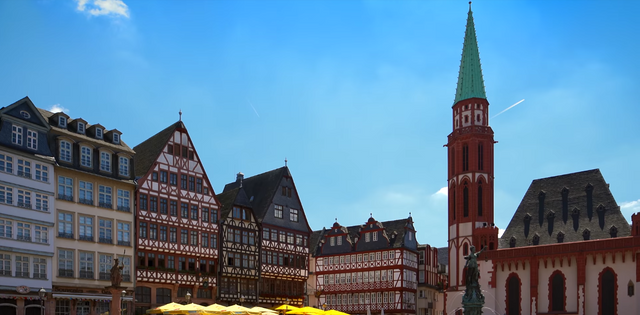
There are some cities which refuse to lay down.
They possess a certain spirit which can push through
the rubble of history’s most turbulent times,
to grow, flourish and flower.
The German city of Frankfurt is one such city.
For centuries, Frankfurt has been one of Europe’s
most important and enduring trading capitals.
Despite a history of fires, plague, occupation and war,
it continues to rise.
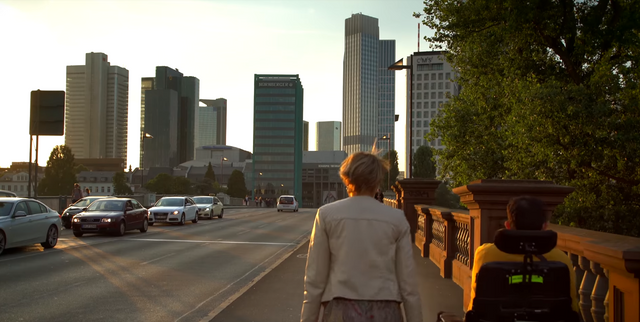
Frankfurt today is home to the European Central Bank,
The German Stock Exchange and an airport which
handles almost 60 million travelers a year.
Yet surprisingly, it’s relaxed too,
a place where tradition and beauty are lovingly
cultivated and enjoyed.
This balance of dynamism and tradition is
best exemplified in the city’s architecture.
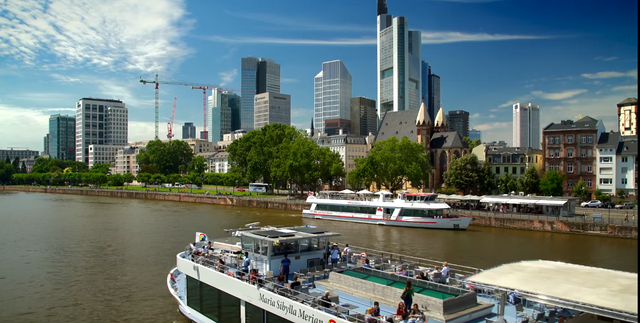
Frankfurt is often called Mainhatten,
due to its position on the Main River
and a skyline that often feels more American
than European.
Yet the city, which was once home to one of
the most glorious medieval centres in Europe,
still nurtures its proud heritage through
rebuilding and restoration projects.
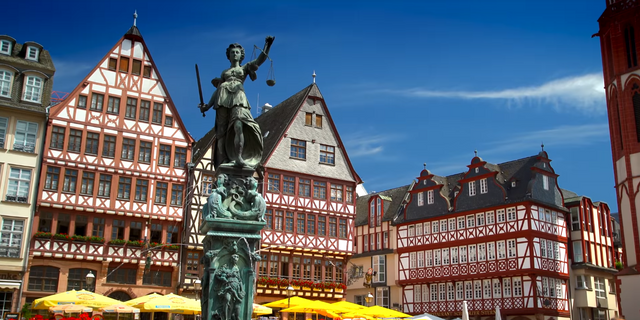
Despite its stature as a financial giant,
Frankfurt remains surprisingly compact.
Most of its attractions are clustered close
to the city centre,
making the city perfect for exploring on foot
or by bicycle.
Cross the Eiserner Steg, the city’s beloved
pedestrian bridge,
into Frankfurt’s ancient heart, the Romerberg.
Since the 9th century,
this medieval square has witnessed
the very best and worst of times,
from fairs, tournaments and coronations,
to executions and firestorms.
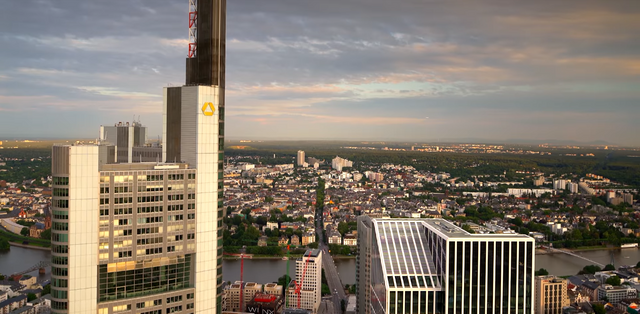
After being devastated by allied bombs in
World War Two,
many of the square’s most important buildings
have been lovingly restored.
Overlooking the square is the Römer,
which served as Frankfurt’s city hall
for over 600 years.
Just across the Square rise some of Frankfurt’s
iconic half-timbered houses,
as well as the spire of Old St. Nicholas Church,
which miraculously survived the almost total
destruction of the old town.
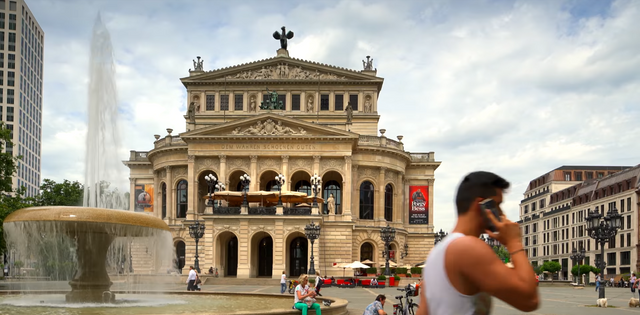
From the Romerplatz, it’s time to head deeper
into the old city.
Whichever direction you take,
Frankfurt’s historical treasures await.
Just a three-minute walk to the east,
visit the city’s cathedral, the Kaiserdom,
in all its red-sandstone and golden glory.
Just to the west of Romerplatz,
is the cradle of German Democracy,
the Paulskirche, where the country’s
first elected parliament met in 1848.
While just two blocks further,
is another of the country’s
most important birthplaces,
Goethe-Haus.
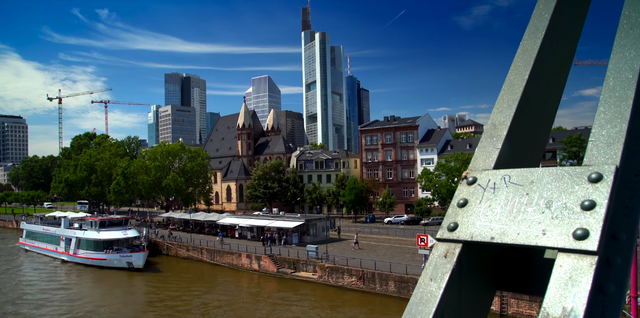
It was here in 1749, just as the clock struck midday,
that one of Germany’s greatest writers and poets,
Johann Wolfgang von Goethe came into the world.
From the Goethe family home,
head north to Hauptwache.
Turn left to admire the symphonic curves of
Frankfurt’s historic opera house.
Or turn right, and head into the future,
along the Zeil,
Germany’s equivalent to Fifth Avenue.
Just a few blocks away,
explore the sometimes-perplexing world of
modern art at MMK,
a triangular shaped gallery
that Frankfurters refer to as,
“the piece of cake”.
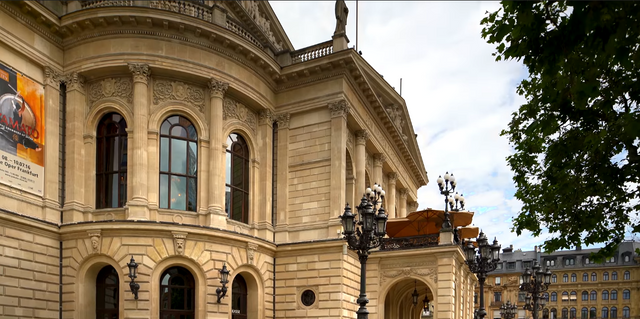
While down by the river
at the Historical Museum,
the story of Frankfurt unfolds,
in all its triumphant and trying chapters.
When it comes to Germany’s great museum cities,
Frankfurt is one of the greats.
Recross the river to its southern embankment,
the Museumsufer.
In the eighteenth century the city’s elite
built elegant villas across from the old town.
Today, many of these villas house
specialist museums,
such as the German Film Museum.
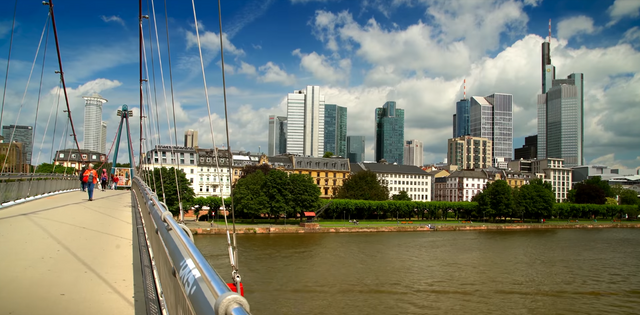
Here you can follow the history of film,
from the earliest optical entertainments,
to all the elements that go into crafting
the blockbusters of today.
Just next door at the German Architecture Museum,
spend an hour or two exploring
the thousands of plans
and hundreds of scale models which have helped
shape the world’s skylines.

Lovers of fine art are also catered for
at the Stadel Museum,
a world-renowned gallery which houses treasures
by many of Europe’s classical and modern masters.
Frankfurters have turned relaxation into
an art form too,
whether it’s just soaking up the sunshine
on the banks of the Main,
or sharing a few bembels of apple wine with friends.
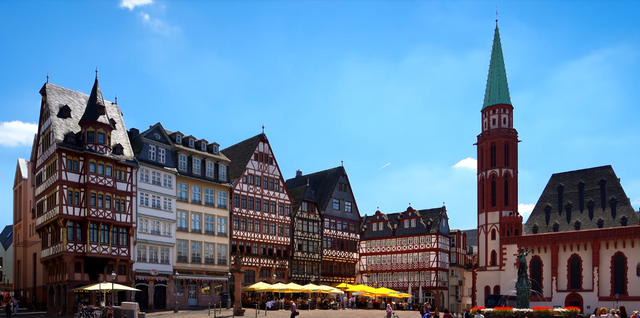
Just behind the museum embankment,
lose yourself in Old Sachsenhausen,
where you’ll find narrow lanes lined with
traditional houses,
and some of the city’s cosiest bars and
ebbelwei pubs.
Once you’ve replenished your energy,
hop on a tram to the city’s northwest
and spend a few hours walking with all creatures
great and small at the Naturmuseum Senckenberg.
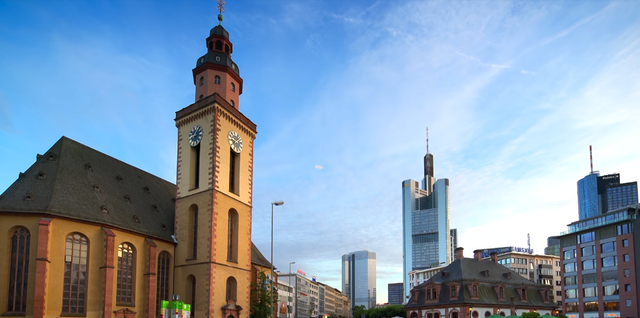
Most popular of all are the remarkable remains
of 50-million year old dinosaurs,
many of which were unearthed just 22 miles away
at the famous Messel Fosil Pit.
Just to the north of the natural history museum,
unwind amid the forests, floral displays
and lakes of the Frankfurt Botanical Gardens.

Then enter the extraordinary world of tropical
and sub-tropical plant life at the Palmengarten.
70 years ago as the city smouldered from war,
few could have imagined that these greenhouses
would ever again see such beauty,
that this city would ever again experience
such peace and prosperity.
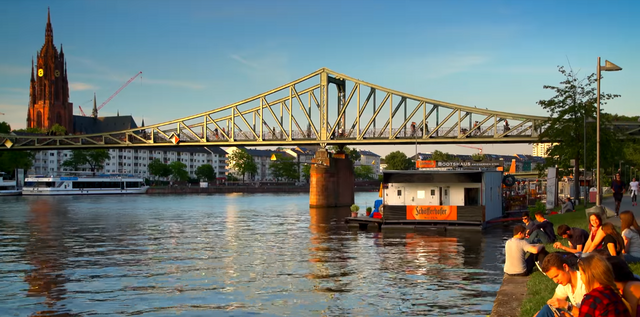
But prosper it has,
and now that prosperity is a bounty
that the entire world can share.
